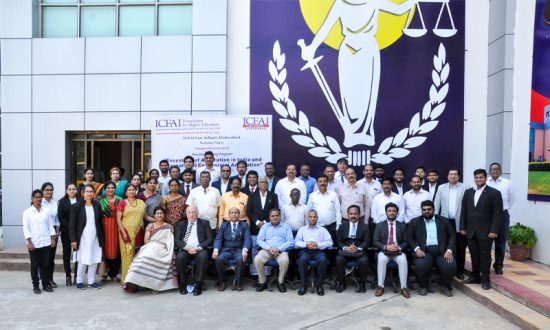Affecting educational systems worldwide, the COVID19 pandemic has led to near-total closure of schools, universities, and colleges. This unexpected and unwanted guest has disturbed the functioning of the law school equally like any other professional colleges and universities, which has resulted in the ICFAI law school closing due to the pandemic lockdown from March 2020, 2020. “With the help of technology, by using Zoom, Cisco WebEx and Google classroom software, online classes were conducted, uploaded the study material, clarified doubts through Google classrooms, WhatsApp calls and personal calls. We are strictly adhering to the directions of the UGC, BCI, and Government. Technology has come handy during this lockdown period”, says Prof A V Narsimha Rao, Director, the ICFAI Law School, Hyderabad.
A constituent unit of the ICFAI Foundation for Higher Education a deemed-to-be University, the ICFAI Law School was established with an ambitious objective to strive for the transformation of legal education with a value-added student-centric teaching-learning approach and well designed dynamic curriculum to carve out new generation lawyers. “We envision developing a new cadre of professionals who will not only command a high level of domain proficiency but also have the ability to integrate activities for developing scientific and technological solutions and work standards”, quips Prof. Narsimha Rao.
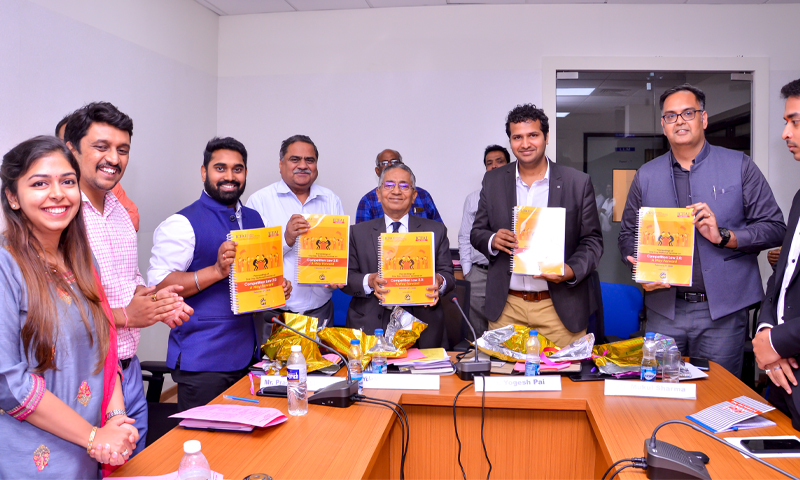
Coping with COVID
ICFAI is concentrating on the online simulation programs, such as moot competitions and mediations, where the students have won two online moot court competitions during the lockdown under the guidance of the faculties. During the present lockdown scenario, the most challenging issue ICFAI is facing is the evaluation of the student performance in academics and preparing the results. The law school has decided to conduct the online examination for its final year student in July, without compromising on the quality of the legal education and declare the results by August.
“We have planned to conduct the final/end term examination to the students other than the final year once the college reopens as per the guidelines of the BCI. Thus, the physical classroom education has been modified to the online classes and physical examination to online examination model”, adds Prof. Narsimha Rao. As suggested by UGC, ICFAI plans to reopen in August for all sections and in September for the first semester students. “We are conducting the entrance examination online, personal interviews from the first week of July on zoom. If the Government instruct to close the campuses and hostel further, we will start online classes as per the schedule. The law school has sufficient bandwidth for conducting online classes”, says Prof. Narsimha Rao.
With active and professional networking with legal professionals, judiciary and advocates, ICFAI organises a residential training program every year during the summer vacations to young advocates of Telangana and Andhra Pradesh, in coordination with the Bar Council of Telangana and Andhra Pradesh. “We have organised an All India University level Moot Court Competition jointly with the Bar Council of India, where the advocates of High Courts and District courts attended and acted as judges for the student’s moot court and mediation competitions, along with participating in various conferences and seminars we organised”, says Prof. Narsimha Rao.
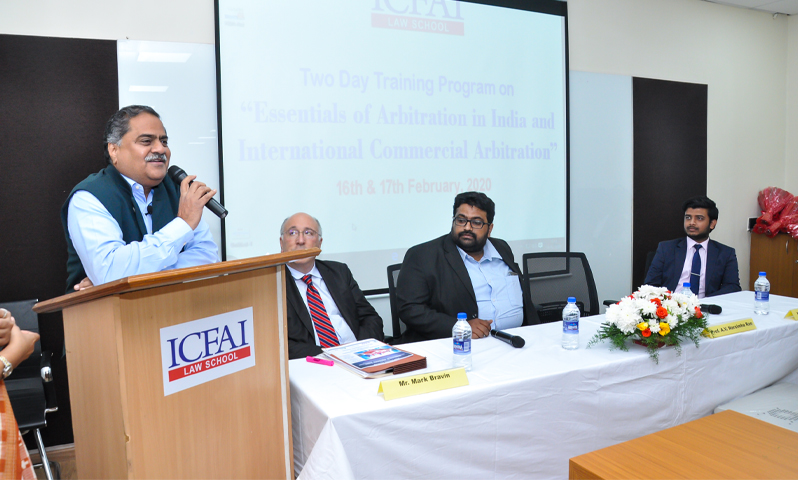
The students of ICFAI also intern with advocates, law firms, and some of the government institutions, where the senior advocates would be their project guides for their internship projects. Prof. Narsimha Rao adds, “We have nominated two advocates to the Board of Studies and also into the Academic Council, to provide their views on the curriculum and to improve the quality of the curriculum”.
Also, ICFAI has donated law textbooks, reference books, and commentaries along with 11 computers and printers with an online database, for the benefit of advocates and judges of the High Court of Telangana. “The Judges, Senior Advocates, Partners and Associate Partners of Law firms regularly visit our school and interact with the students through expert lectures and also during the activities. Three former judges of High Court of Telangana and Andhra Pradesh are associated with our school as adjunct faculties and train students in procedure laws by sharing their expertise and experiences every week”, points out Prof. Narsimha Rao.
Bridging the Student-Industry Gap
ICFAI has excellent professional links with the judges of the Supreme Court of India, and few of them have also inaugurated the school’s programs. Along with this, the alumni association of the law school is even playing a significant role in the networking of ICFAI with the legal professional bodies.
Providing practical training, clinical courses, legal aid problems, client counselling, and mediation simulations, participation in seminars and conferences, interactions with the judges of Supreme Court, High Court, District Courts, tribunal and senior advocates of different courts, in addition to the regular classroom lectures, discussion forums, and extracurricular activities, ICFAI aspires to give its students 360-degree learning experience.
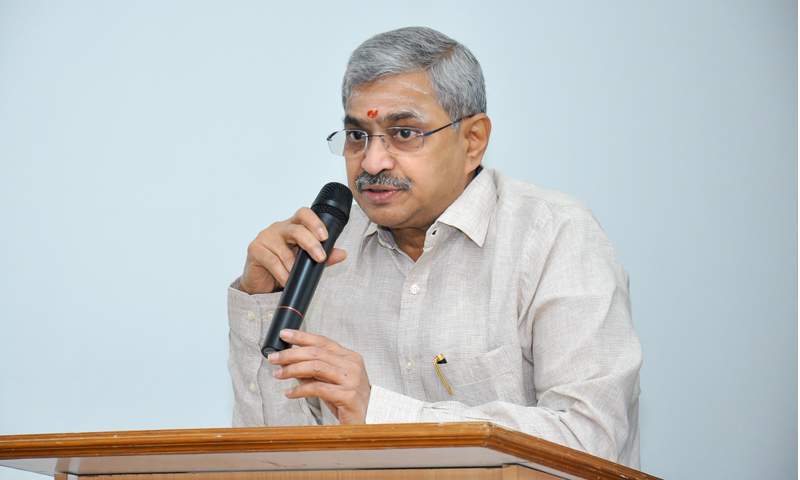
The law school takes exceptional care of its students with marginalised learning capacity by providing additional and focused classes and mentoring. “The students undertake various activities through 11 live active clubs to improve the skills in the areas of moot court, mediation, negotiation, and client counselling, oral and written communications through debates and essay writing competitions, promotes the clean environment through the environmental club and cultural and sports competitions”, says Prof. Narsimha Rao.
Students of ICFAI have won the All India Inter-University Moot Court Competition organised by the Bar Council of India in the academic year 2019-20. Also, the students have won prizes and certificates in the field of sports, debate, moot court, mediation, client counselling, and cultural competitions at the national level. Prof. Narsimha Rao adds, “Few of our students got admissions abroad in law schools of famous universities with fee concessions and scholarships. Some of them have passed the accreditation tests required for the arbitrator. Four students of previous batches got selected as a junior civil judge. Thus, students have done a wonderful job and got recognition”.
Pillars of Strength – Faculty of ICFAI
The faculty is of ICFAI is its strength and are known for their efficiency, commitment, and proactive attitudes. With around 47 faculty members teaching law subjects, ICFAI also has exclusive faculty members who teach management and social science disciplines, along with three former High Court judges as adjunct faculty. About 29 teachers at ICFAI have a doctorate, while 8 of them are NET qualified and the rest of them are pursuing the PhD program. “In addition to the classwork, they write articles, participates in the workshops, conferences, and seminars organised by the Law School and also outside the school across the country. Few faculties have presented their papers in the international seminars and conference held outside the country”, points out Prof. Narsimha Rao.
The faculty of ICFAI also get an opportunity to attend a weekly research seminar, where one of them even get to present their research papers in front of all the faculties participating in it. Along with this, they get to coordinate and organise seminars and conferences at national and international level. ICFAI publishes a quarterly journal, IUP Law Review, which contains articles authored by the faculty members.
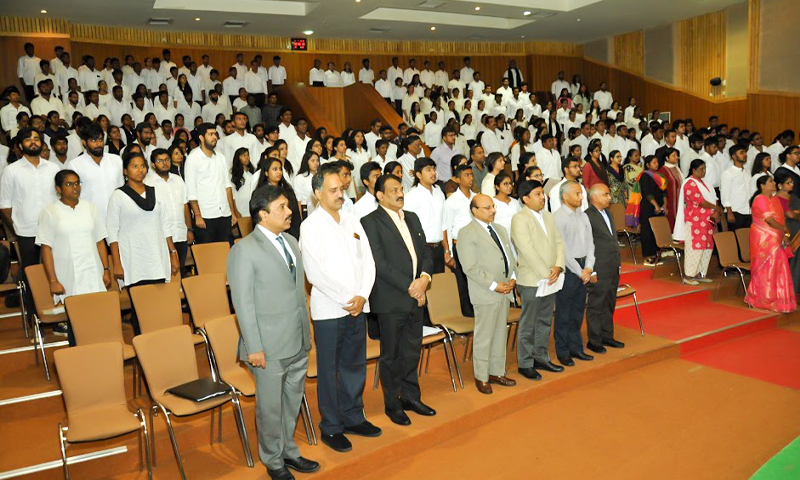
Also, ICFAI is known for its unique mentoring process of the students. Every faculty will act as the mentor for a group of students, whom they guide, monitor, and help in their personal and professional works. “The faculty will be guiding the students to participate in the national level moot court and other competitions. They help the students in procuring the internships, monitor the project as a faculty guide, and also contacting the parents of the students to notify the progress of the students”, adds Prof. Narsimha Rao.
The faculty of ICFAI is always working on research projects and activities other than regular academics. They are encouraged to write articles, edit books, and take part in national and international seminars and conferences. The school also supports its faculties financially for presenting papers at national and international conferences and seminars.
Prepping Students for the Cutthroat Competition
Carving students into legal professionals, most students of ICFAI prefer to choose litigation in place of corporate jobs as they got motivation during internships and interaction with the advocates and judges. Although, a small part of students opt for placement and 100% of placement assistance is provided by the law school’s Career Guidance Cell, which provides the soft-skill training and refresher classes relating to essential concepts and fundamentals of law.
With ICFAI having an extensive and robust network, it arranges personal interviews with the students. Although COVID19 has been a hindrance to the placement process, the college has organised most of the procedures to happen smoothly through online tests and interviews. “Few of our students got collected from different companies and waiting for results. The Career Guidance Cell also trains the students for competitive examinations such as Civil Service Examinations, judicial examinations, and company secretaries examinations”, opines Prof. Narsimha Rao.
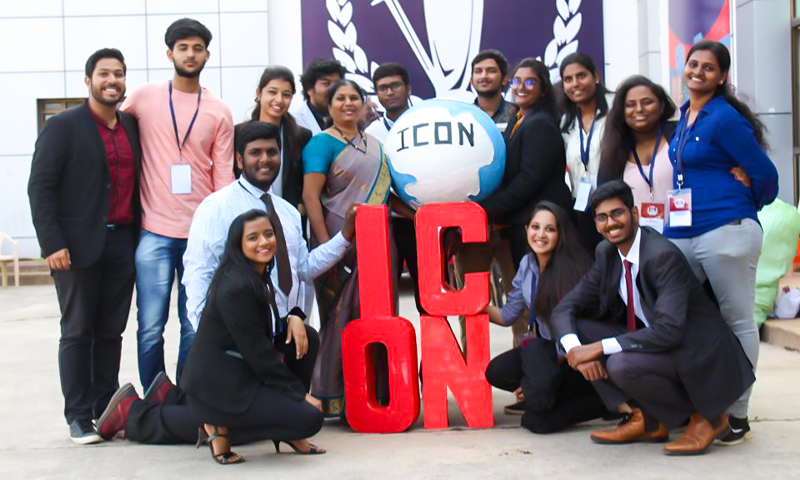
As the economic conditions are not encouraging, some of the students got placed in companies with reasonable pay packages, while some of them are working as associate partners for law firms. ICFAI is doing its best in tapping its secure networking with the legal professionals and corporate to provide placement assistance to the students.
Motivating their students to strive for more, ICFAI has introduced the “Entrepreneurship and Leadership” and “Skill Development” subjects in the curriculum. The law school has also started an “Entrepreneurship and Innovation Cell”, to motivate its students to start new ventures and support them financially and technically. “Our students have developed a website where the user can access information about advocates and courts for each category of law, substantive or the procedural. Another student has developed software that can be used for networking of students and advocates. Along with us, a student has developed a website for providing free services to villagers”, adds Prof. Narsimha Rao.
Doing their bit towards making the society better, ICFAI has adopted 5 villages near the college campus, which the students and faculty visit regularly, conducting legal awareness camps in schools and gram panchayat offices for the villagers about their voting rights, consumer rights, domestic waste management, hygiene of surroundings, swatchata, child rights, against child marriages, child abuse, and many more topics. The members of the Legal Air Club, Environment Club, and Cultural club students undertake various activities and use the street plays, poster display, and discussion forum for increasing legal literacy.
“During the pandemic, because of the lockdown and physical distances, few faculty visited the villages and explained the need for self-regulation, sanitation, physical distancing. The students of law school also contributed to the distribution of necessaries to the people in distress. The University has donated almost one crore rupees for the supply of groceries, including essential items and sanitisers, masks, and many more”, says Prof. Narsimha Rao.
Paving the Road Ahead
The students of ICFAI get a chance to improve and possess the analytical skills, logical approach to the problems, high level of soft skills, commitment towards their work and profession, networking capabilities, and go-getter attitude. “The present law students are more active, takers of the challenges, and work hard to accomplish their objectives and goals. They are more technical savvy and explorers of information technology. They have definite planning and career objectives and energies to realise their dreams. They have better negotiation skills and compromising attitudes without diluting the professional ethics.”, opines Prof. Narsimha Rao.
The ICFAI Law School, Hyderabad has an objective to be one of the top law schools in India imparting legal education. In this direction, the law school plans to adopt cutting edge curriculum having the blend of theory and application of law equally. It has a clear mandate to prepare the students for market-ready legal professionals. “We are striving to provide a 360-degree learning process with student-centric approach having quality checks at every point and takes initiatives to improve the key indicators of the program every semester”, adds Prof. Narsimha Rao.
During the Covid-19, ICFAI is planning to use the technology and digital platforms for successfully imparting the law program. To achieve its objective, it has designed hard and soft resources, more especially the tools of information technology, digitally equipped classrooms, digital libraries, computer labs, career guidance cells,. The soft resources include the digital databases, human resources including the proficient faculties, supporting staff, and well-defined assessment and evaluations, the culture of innovations and creativeness, and well-defined systems in place.
ICFAI has also prepared a dynamic curriculum to meet the expectations of the legal arena to transform legal education to the next highest level of quality. In this direction, it regularly interacts with the judicial officers, industrialists, associations of businesses, and academicians for improvements and developments, to provide updated and industry-ready lawyers to the world.
Prof. Narasimha Rao, Director, ICFAI Law School
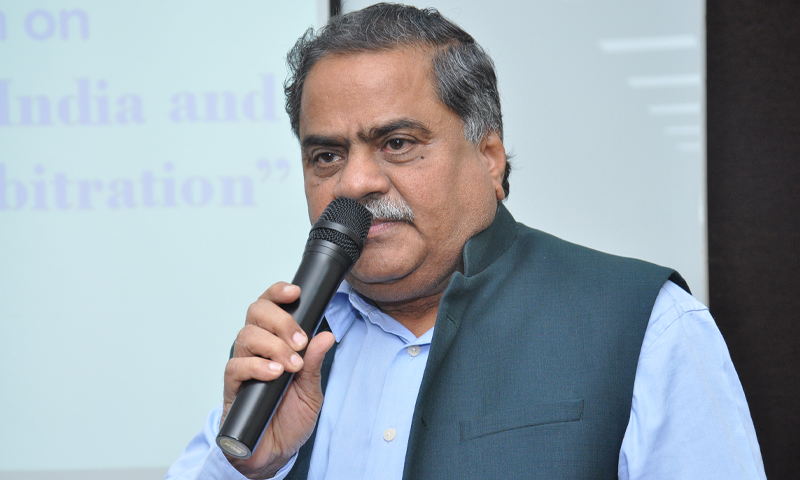
Prof. Narasimha Rao has a total experience of 20 years in teaching law. Currently serving as the Director at the ICFAI Law School, he has also been a visiting professor. Prof. Narasimha has been a part of the ICFAI family since 2007, when he joined as an Associate Professor and Dean, Faculty of Law. Prof. Narasimha has also served the Bank of India in different designation for almost 20 years. Having conceptualising, editing and publishing articles and journals, Prof. Narasimha has edited 20 books and published 4 original books.




